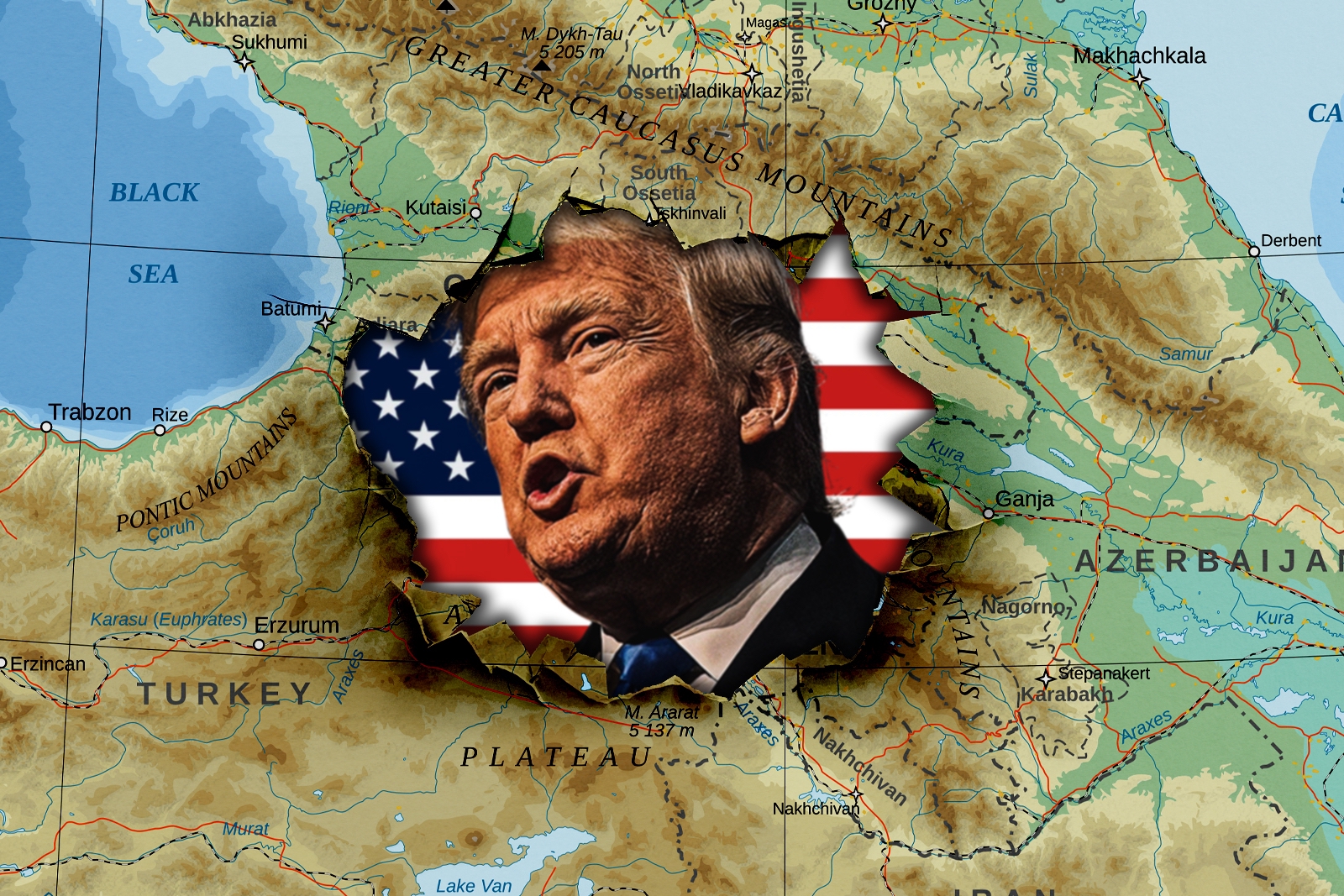
Trump’s Second Act: What’s Next for the South Caucasus?
Donald Trump’s return to the world stage holds profound implications for the South Caucasus. This region, situated at the crossroads of Europe, Asia, and the Middle East, remains a pivotal arena for global powers. Any shift in U.S. policy under a second Trump administration could have significant ramifications for regional stability and the global balance of power.
Assessing whether Trump’s re-election would result in greater engagement or neglect of the South Caucasus requires an understanding of his broader foreign policy approach and the evolving geopolitical landscape. Trump’s penchant for limiting U.S. involvement in foreign conflicts and his preference for direct, bilateral deals could redefine U.S. involvement in the region. This could either further destabilize the South Caucasus or create new alliances, depending on the dynamics between the U.S. and influential regional players like Russia, Turkey, and China.
During Trump’s first term, his foreign policy revolved around the ultra-nationalistic “America First” doctrine, emphasizing domestic priorities and transactional relationships over enduring international commitments. This often left strategically significant regions, including the South Caucasus, on the periphery of U.S. foreign policy. Despite escalating tensions in the area—notably the 2020 Azerbaijan-Armenia conflict—the Trump administration largely maintained a passive stance, prioritizing other regions deemed more critical to U.S. interests.
In the face of the Second Karabakh War, which reshaped the geopolitical dynamics of the South Caucasus, the Trump administration opted for restraint. U.S. officials issued calls for a peaceful resolution but avoided direct involvement, in stark contrast to the active roles played by Russia and Turkey. This approach reflected a broader tendency within the Trump administration to sidestep conflicts within Russia’s perceived sphere of influence, a stance shaped by concerns over exacerbating tensions with Moscow and further diminishing U.S. leverage in the region.
While U.S.-Georgia relations under Trump were generally stable, characterized by security cooperation and support for Georgian sovereignty, Trump’s skepticism toward NATO expansion and his transactional view of alliances introduced uncertainties. His administration’s unpredictable foreign policy, coupled with occasional conciliatory rhetoric toward Russia, cast doubt on Georgia’s NATO aspirations and left the future of U.S.-Georgia relations unclear.
In contrast, the outgoing Biden administration has taken a more proactive approach in the South Caucasus, leveraging Russia’s preoccupation with the war in Ukraine to increase U.S. engagement. Biden’s policies have emphasized fostering peace in Azerbaijani-Armenian and Turkish-Armenian relations while also curtailing aid to Georgia due to concerns over its political trajectory under the pro-Russian Georgian Dream party. This shift highlights the strategic recalibration of U.S. involvement in the region.
A second Trump presidency would likely revisit the transactional approach that defined his first term, focusing on short-term strategic gains with key regional powers. For the South Caucasus, this could mean navigating a delicate balance between U.S. interests and the agendas of Russia, China, and Turkey. Trump’s history of prioritizing economic considerations, particularly in the energy sector, suggests that any U.S. engagement would be driven by tangible benefits rather than long-term commitments.
Russia’s entrenched influence in the South Caucasus, bolstered by its military presence in Armenia and pivotal role in the Nagorno-Karabakh peace process, would likely remain unchallenged under a second Trump term. Trump’s inclination to seek cooperative relationships with Moscow could further cement Russian dominance in the region, reducing U.S. influence to the periphery.
China’s growing footprint through its Belt and Road Initiative (BRI) adds another dimension to the South Caucasus’ strategic calculus. Azerbaijan and Georgia—key transit hubs for the BRI—may attract U.S. attention under Trump’s critique of China’s expanding global influence. However, such engagement would likely focus on economic and infrastructural projects rather than diplomatic or security commitments.
Turkey’s assertive role in the region, underscored by its support for Azerbaijan during the Second Karabakh War, also factors into the equation. Strengthening U.S.-Turkey relations could indirectly bolster American involvement in the South Caucasus, particularly in areas of counterterrorism, NATO obligations, and regional security. Nevertheless, such interactions would be inherently selective and transactional.
Iran’s role, particularly its partnership with Armenia, further complicates U.S. policy considerations. The Trump administration’s “maximum pressure” campaign against Iran—characterized by withdrawal from the Obama-era Joint Comprehensive Plan of Action (JCPOA) and stringent sanctions—suggests that a second term might tilt U.S. support toward Azerbaijan, Iran’s regional rival. This approach could marginalize Armenia in U.S. foreign policy calculations.
In line with the “America First” doctrine, a second Trump term is expected to maintain limited engagement in the South Caucasus unless specific U.S. interests, such as energy security or strategic competition with China and Russia, come to the fore. Should Trump view the region as vital for diversifying Europe’s energy sources, particularly through the Southern Gas Corridor linking Azerbaijan to European markets, U.S. involvement may intensify. However, such engagement would likely remain transactional, emphasizing energy deals and infrastructure over sustained diplomatic efforts.
Ultimately, under Trump’s leadership, the South Caucasus is likely to see diminished U.S. involvement, with a focus on selective, interest-driven interactions. This retreat could create a vacuum for Russia and China to expand their influence, leaving the region to navigate an increasingly multipolar landscape without substantial American support. Armenia, in particular, risks being sidelined, while Azerbaijan and Georgia may engage with the U.S. primarily on economic and energy-related issues.
As Washington adopts a more detached stance, the region’s stability and alignment with Western interests remain uncertain, underscoring the complexities of a Trump 2.0 foreign policy in the South Caucasus.
